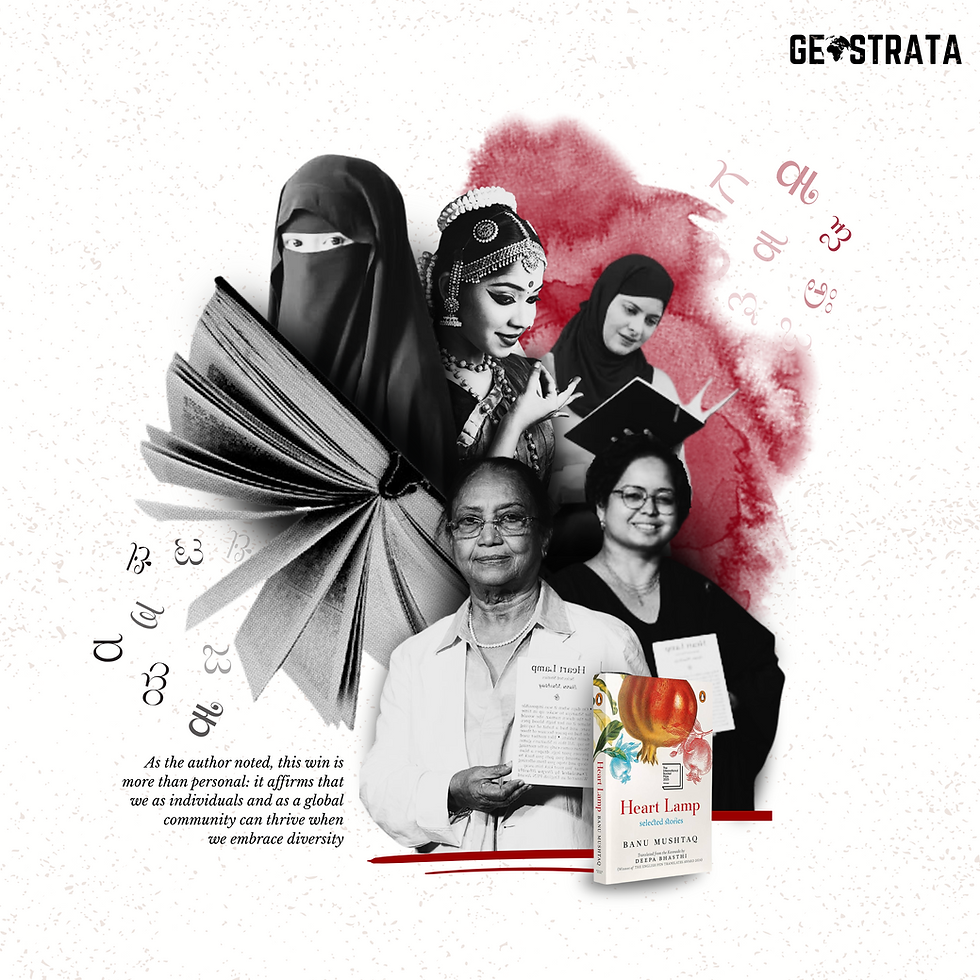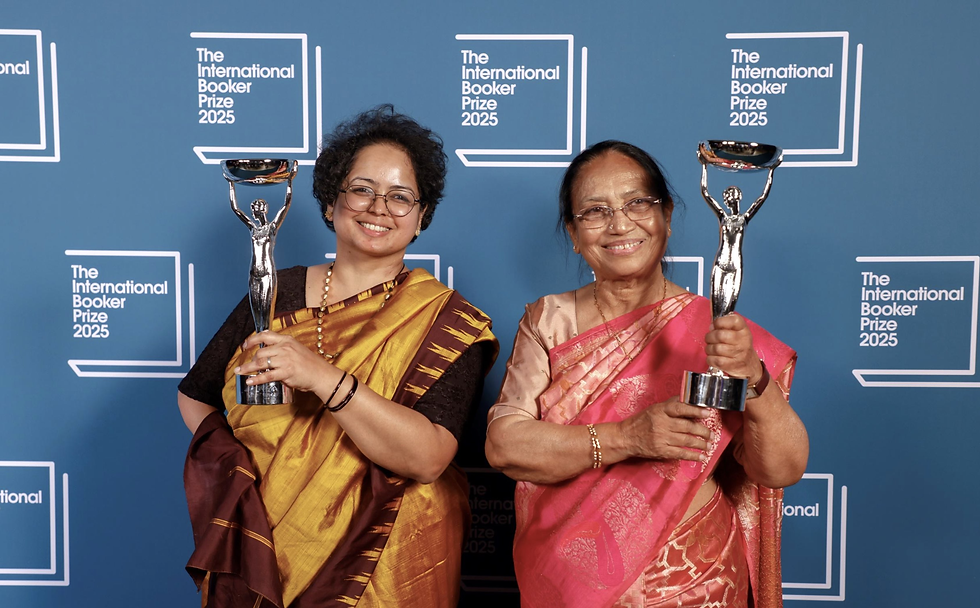Heart Lamp: A Kannada Voice On The Global Stage
- THE GEOSTRATA

- Jul 21, 2025
- 4 min read
The 2025 International Booker Prize winner Heart Lamp, authored by Banu Mushtaq and translated by Deepa Bhasthi, is a landmark collection of 12 short stories – the first short-story collection ever to win the Prize – that chronicles the lives of Muslim women in Karnataka’s patriarchal communities. Written over 30 years, the tales are vivid, “beautiful, busy, life-affirming stories” that blend humour and wisdom.
Illustration by The Geostrata
Heart lamp received praise as “something genuinely new for English readers,” a “radical translation” that brings unheard voices to the world stage. As the author noted, this win is more than personal: it “affirms that we as individuals and as a global community can thrive when we embrace diversity”. Mushtaq’s collection spans women’s everyday struggles and quiet triumphs.
The stories – selected by Bhasthi from about 50 tales spanning Mushtaq’s six story collections – depict mothers, daughters, and grandmothers navigating gender, class, and caste constraints.
For example, in one opening tale the character Zeenat observes: “No matter which religion one belongs to, it is accepted that the wife is the husband’s most obedient servant, his bonded labourer.” In another, Amina courageously defies religious authority by secretly having a tubal ligation after seven pregnancies.
These narratives critique social orthodoxy and show how strict customs circumscribe women’s lives, restricting education, confining them to marriage and motherhood, and demanding family honour at their expense. Yet the tone is not didactic: the stories contain the feminism for which Mushtaq is known, but above all, they are “beautiful accounts of everyday life and particularly the lives of women”.
Mushtaq’s language reflects a rich oral tradition. Bhasthi’s “radical” translation deliberately retains regional flavour, producing an English “with a very deliberate Kannada hum”.
She preserves code-switching and local idioms, and avoids italics for untranslated terms. This creates a “plurality of Englishes” that honours the book’s roots. The style is at once witty, vivid, colloquial, moving and excoriating, blending warmth and sharp insight. Mushtaq’s spare prose often carries a quiet power – a mother’s small kindness, a daughter’s comforting embrace, or a whispered prayer – which builds into profound emotional impact.
In the title story, for example, a suicidal young mother is saved simply by feeling her child’s heartbeat on her chest, a “steady, insistent glow” of love. Such moments – imagined with clarity and grace – give the collection its intense intimacy. The core themes of Heart Lamp – patriarchy, faith, caste, and resistance – resonate universally. The book vividly describes women’s lives, reproductive rights, faith, caste, power and oppression.
It shows women quietly asserting agency; one wife secretly studies by lamplight, another volunteers for a dangerous rescue in place of her husband, a third simply bravely bears her pain in silence. The collection highlights sisterhood and resilience; women share laughter and gossip in kitchens, counsel each other on marriage and mourning, and find solidarity amid hardship.
These portraits of wit and defiance – from stoic mothers to opinionated grandmothers presents the resilience, resistance, wit and sisterhood of everyday women. Each tale in Heart Lamp feels like a vital thread in a larger tapestry of Indian womanhood, one patiently woven over decades.
WHAT IT MEANS FOR INDIAN LITERATURE
Heart Lamp’s Booker win is historic for Indian letters. It is the first-ever Kannada-language book to receive the prize, and only the second Indian title overall to do so, after Geetanjali Shree’s Tomb of Sand in 2022. In a literary world long dominated by English and a few global languages, this recognition is a breakthrough for Kannada and other regional tongues.
As Mushtaq herself noted on stage, the award is “a victory for diversity”. Translator Bhasthi echoed this pride: “What a beautiful win this is for my beautiful language,”.
The win will “reshape how Indian literature in translation is regarded,” insisting that previously sidelined voices can command a global stage. This milestone may spur wider interest in India’s many literatures. Presently, very few books are translated from Indian languages, so Heart Lamp’s triumph – like that of Tomb of Sand – signals changing tides.
Image Credits: Rightful Owner
The prize highlights the creativity and depth of non-English Indian writing and encourages publishers to seek more translations from Hindi, Kannada, Tamil, Malayalam, and beyond. By celebrating Mushtaq’s tales of gender, faith, and class, the Booker Prize amplifies India’s cultural diversity.
GLOBAL IMPACT AND SOFT POWER
Heart Lamp’s recognition enhances India’s cultural soft power by projecting regional voices onto the world stage. The collection’s international success brings the nuance of Kannada Muslim life to readers globally, fostering empathy across cultures. By listening to Mushtaq’s characters, readers gain insight into challenges that transcend borders – from women’s agency to the weight of tradition.
In today’s segmented world, younger readers increasingly connect with such translated narratives. In effect, Heart Lamp becomes part of a global conversation, illustrating how literature can bridge gaps; its “quiet power” and humane storytelling invite a global audience to live inside another community’s mind.
Ultimately, the Booker spotlight on Heart Lamp not only honours Kannada literature but also strengthens India’s international literary standing, proving that the country’s rich tapestry of languages and stories commands attention and respect worldwide.
BY TANU NAGAR
TEAM GEOSTRATA
.png)





Great and insightful analysis